Seeing the Potential for Drexel-Salus Collaborations
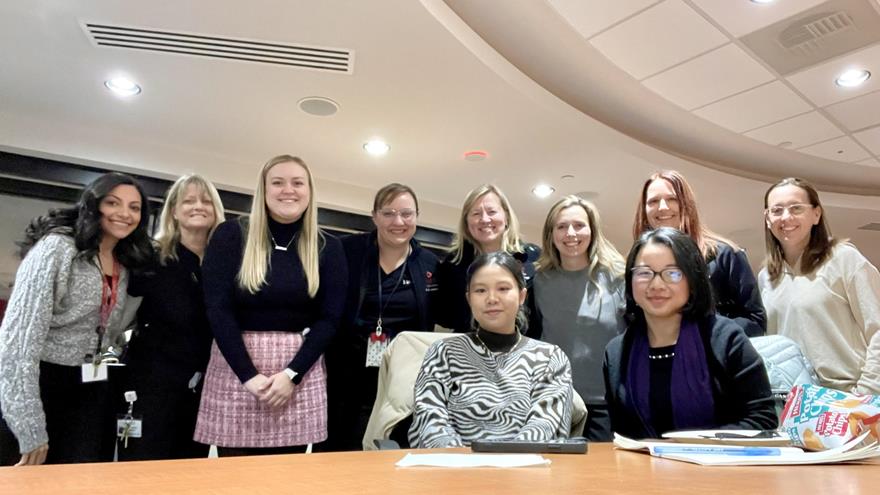
The Drexel and Salus colleagues who met on Salus’ campus in November 2023 to discuss future opportunities for collaboration. Seated are Drexel graduate student Khue Dao, left, and Professor June He. Standing from left to right are PCO faculty members: Associate Dean of Optometric Special Programs and associate professor Bisant Labib, OD; Associate Dean of Optometric Clinical Affairs and associate professor Maria Parisi, OD; Assistant Professor Elizabeth Marunde, OD; Associate Professor Erin Jenewein, OD; Dean Melissa Trego, OD, PhD; Associate Professor Erin Kenny, OD; Assistant Professor Dawn Ciccarone and Associate Professor Erin Draper, OD. Photo provided by June He.
As soon as she heard about Drexel University’s merger with the then-Salus University, and its programs and clinical sites in the Pennsylvania College of Optometry (PCO), June He’s mind began racing.
“I just thought that there had to be some way to do something together, like using Salus medical expertise to help build prototypes and test products in their clinical environment,” said He, an assistant professor of product design in Drexel’s Antoinette Westphal College of Media Arts & Design. “I am working on eyewear design and they are working on vision-related issues. Although our disciplines are very different, there are many shared areas for potential collaboration.”
He regularly teaches “Applied Human-Centered Design” and “Aging & Design” courses as well as an annual themed eyewear design project, such as “Eyewear Design for Diverse Users.” Before transitioning to academia in 2021, she worked as a designer in medical and eyewear fields (including designing eyewear for Warby Parker and Guess).
Drexel’s President John Fry helped He connect with Melissa E. Trego, OD, PhD, dean of the Pennsylvania College of Optometry at Salus and an associate professor. Soon, there were many conversations, emails and meetings about designing products for older patients with vision-related medical conditions as well as people with low vision and blindness.
A few months later, in November 2023, He visited the Salus campus with Drexel graduate research assistant Khue Dao, who is pursuing a MS in human-computer interaction and user experience in the College of Computing & Informatics. They toured the Elkins Park campus and PCO’s nearby The Eye Institute (TEI) clinical site, and met with Trego and other Salus faculty and students. The Dragons visited labs and exam rooms, sat in on interactions between patients and Salus medical professionals and used different vision rehabilitation tools to see how existing products help improve patients’ everyday lives.
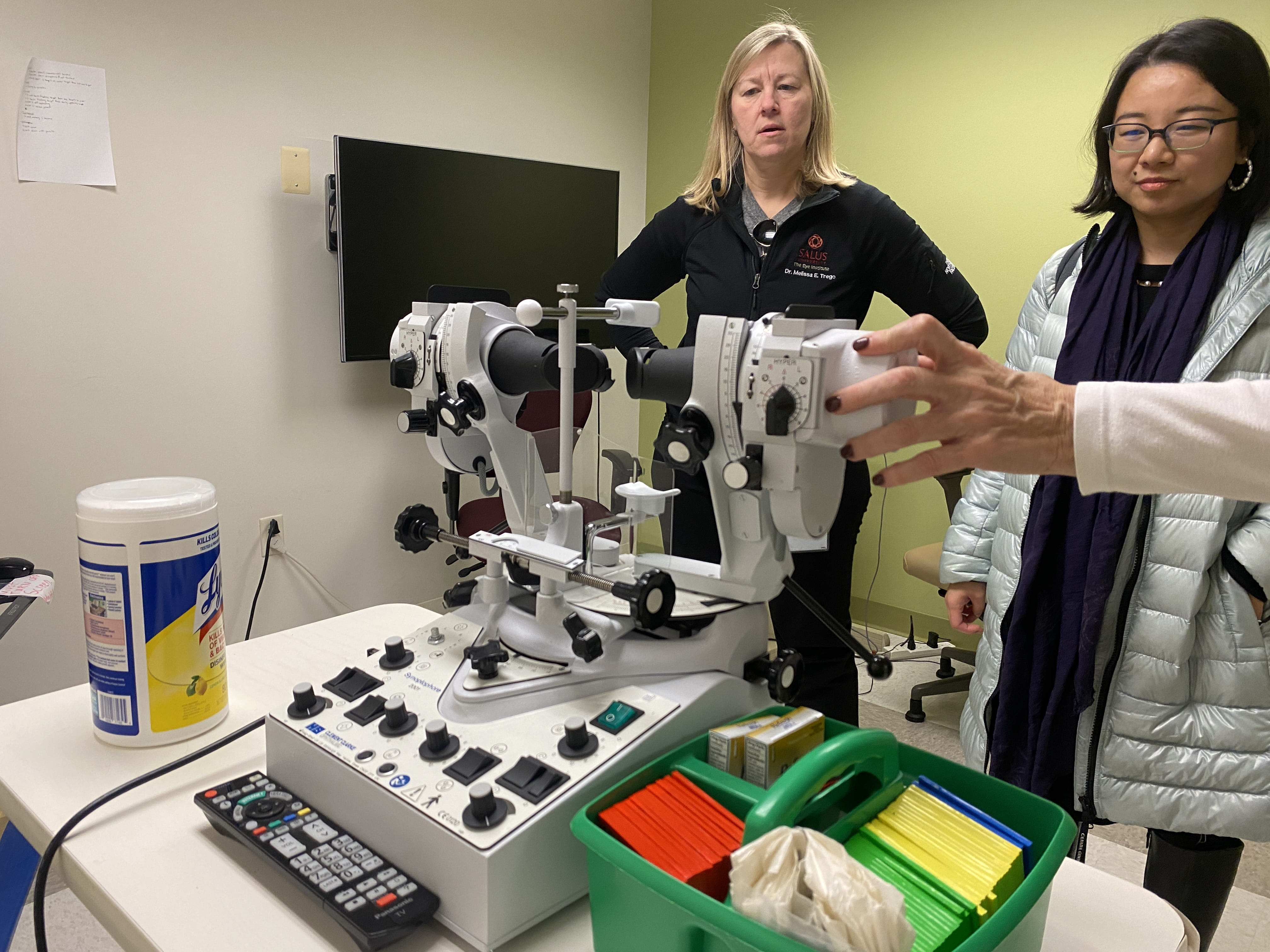
Melissa Trego, left, and June He photographed observing a synoptophore (an ophthalmic device that eye care professionals use to assess and treat binocular vision disorders and eye muscle imbalances) during a tour of The Eye Institute’s spaces in November 2023. Photo credit: Khue Dao.
In April, He hosted Trego for a reciprocal tour of Westphal’s URBN Center and meetings with Westphal Dean Jason Schupbach and other faculty. They visited various design labs, including the Empathic CoDesign Lab (founded and led by He) and the Design and Research for Health Lab (founded and led by Diana S. Nicholas, PhD, a Westphal associate professor, director of Drexel’s MS in Design Research program and coordinator of the minor in sustainability in the built environment). A month later, Trego returned to Drexel to attend the senior thesis exhibition for graduating product design students.
Now, after the Middle States Commission on Higher Education recently approved the merger and the resulting Salus University at Drexel, some of those introductory meetings and ideas are turning into real-world projects.
He is the principal investigator (PI) on a grant with co-PIs Trego and Nichols that was recently submitted to the Salus-Drexel Aging Pilot Research Awards. Both institutions will provide funding to promote interdisciplinary research in two of Drexel’s Areas of Excellence & Opportunity (AEOs): Health Innovation, and Health Equity and Wellness (this proposal also fits into an additional AEO for Human-Centered Design).
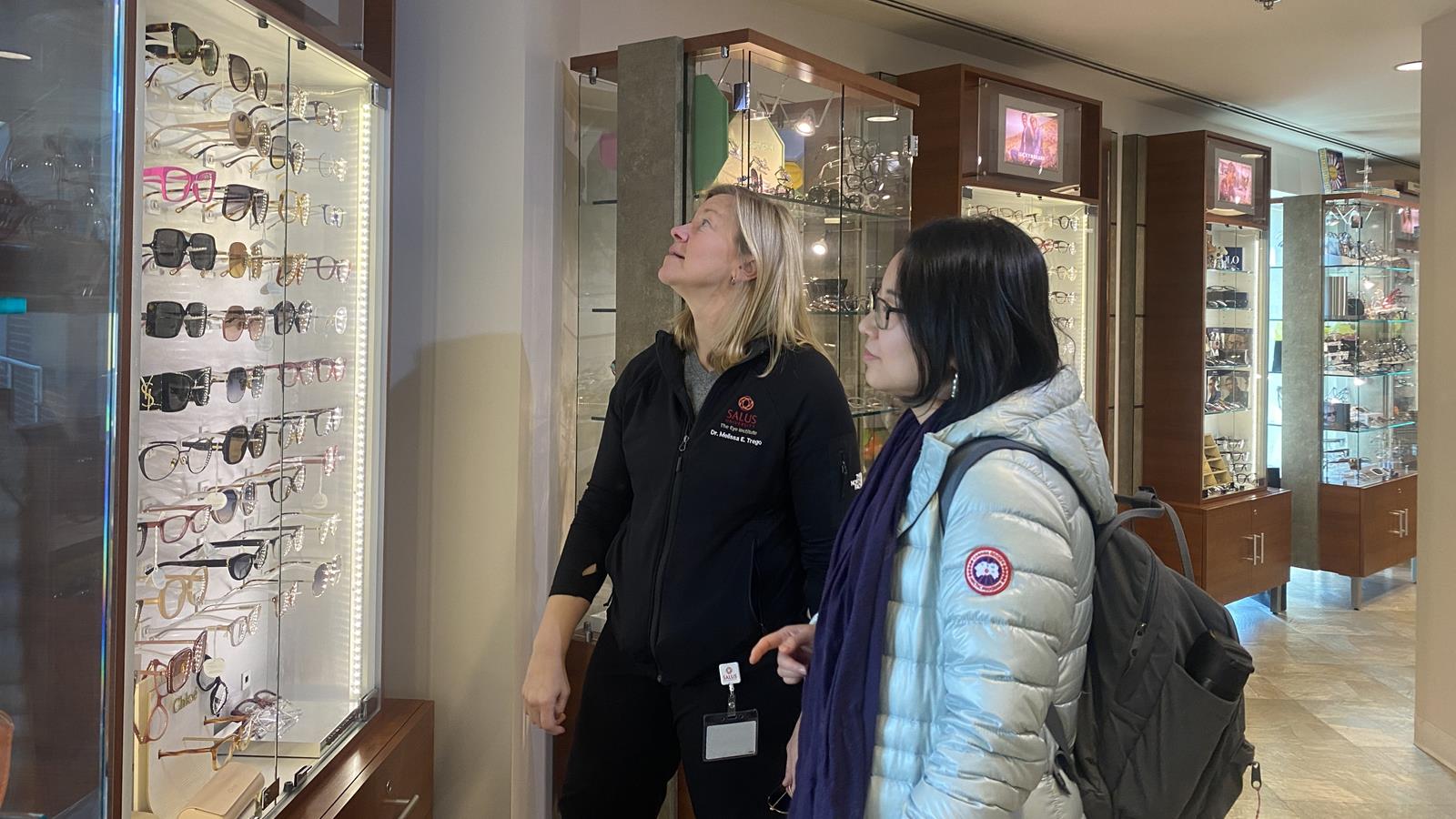
Melissa Trego, left, and June He visited the optical area at Salus’ The Eye Institute in November 2023. Photo credit: Khue Dao.
With their project, titled “Human-centered Product Design for Local Older Communities with Vision Challenges,” He hopes to further develop this Drexel-Salus partnership in eyewear design, the treatment and management of vision rehabilitation, and design research and problem-solving. As part of the “Aging, Design & Healing” course she will teach in the fall, students could create innovative prototypes to meet the everyday needs identified by Salus patients.
“I want students to have the whole picture of aging when they design so they can be very empathetic,” He said. “It will be important for these students to identify and understand users’ challenges in the design process.”
He also believes this grant could be a launching point for seeking external research funding and building future courses, as she’s done in the past for her “Aging & Design” project-based courses. The possibilities are even more endless once Salus academic operations move under Drexel following approval from the Department of Education (which, as the last step of the merger, is expected to be completed in the summer of 2025).
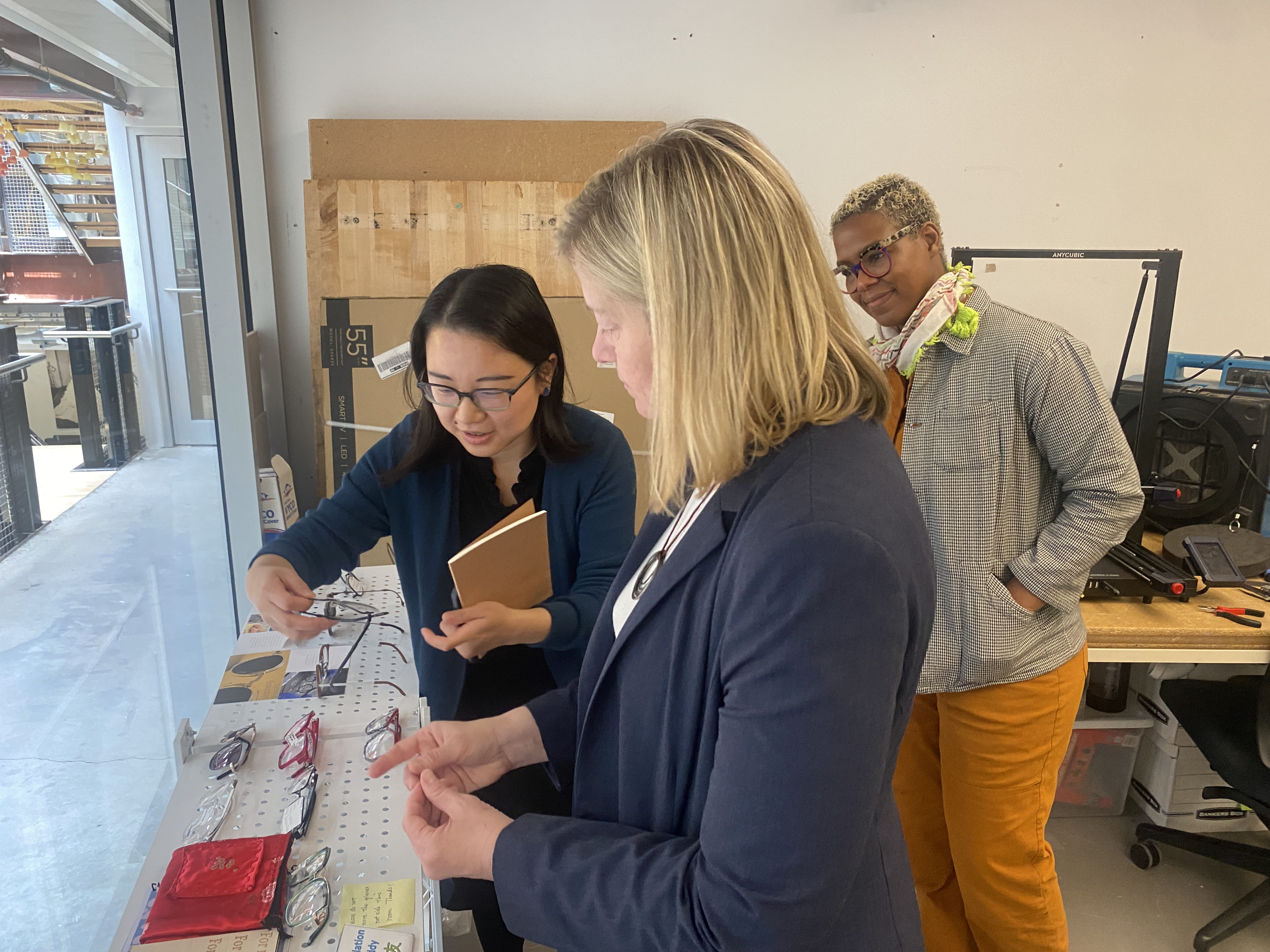
When Melissa Trego visited Drexel in April 2024, June He, left, showed her some product design students’ eyewear prototypes at the Empathic CoDesign Lab she leads. Raja Schaar, associate professor and associate program director for product design in the Westphal College of Media Arts & Design, looks on behind them. Photo credit: Khue Dao.
“With our combined knowledge, one plus one is bigger than two,” said He.
This type of collaboration is nothing new for He, who recently received the inaugural Provost Award for Pedagogical Innovation. She regularly develops classes involving industry as well as internal and external partners for experiential learning projects with real-world connections.
For the first “Aging & Design” course in the spring of 2022, He paired students with older Asian immigrants and local community organizations to co-design products related to older adults’ everyday needs. The second “Aging & Design” iteration, “Creating Age-Friendly Innovations,” was co-taught in the fall of 2022 with frequent collaborator Catherine Quay, PhD, who was then an assistant clinical professor of nursing in the College of Nursing and Health Professions.
Quay was a guest speaker for the third course, “Aging, Design & Entrepreneurship,” in which students learned how to build companies around their products and used a College of Nursing and Health Professions’ Virtual Reality Simulation Lab to see what it’s like living as an older adult. During that fall 2023 course, Arun Ramakrishnan, PhD, director of research labs and associate dean of research at the College of Nursing and Health Professions, and Chuck Sacco, vice dean of educational affairs in the Charles D. Close School of Entrepreneurship, provided support and guidance for the students.
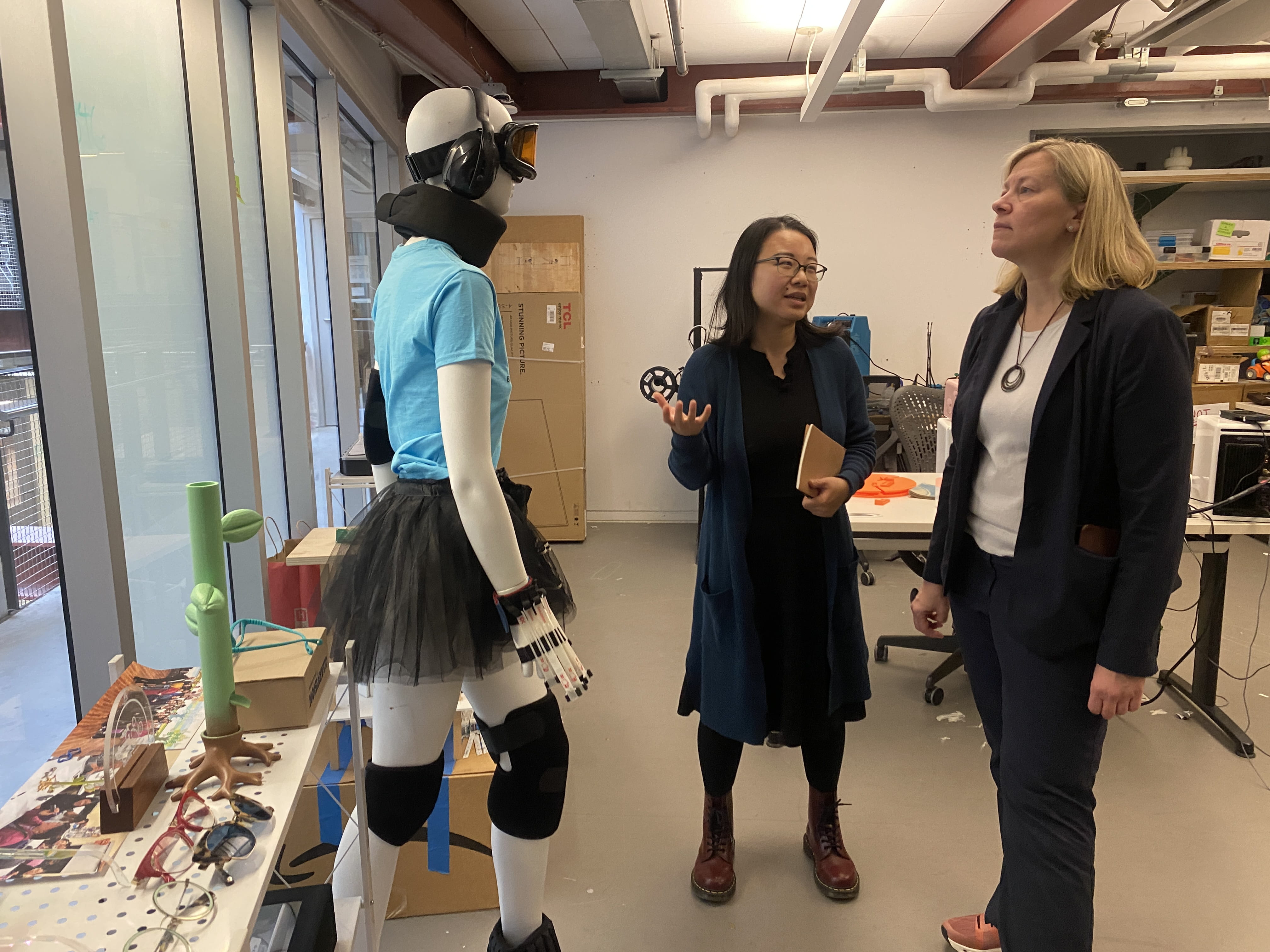
June He, left, and Melissa Trego in He’s Empathic CoDesign Lab in April 2024. Photo credit: Khue Dao.
The fourth class, “Aging, Design & Healing,” will be taught this fall hopefully with support from the Salus-Drexel Aging Pilot Research Awards. It will feature Quay again, now as a guest speaker and in her position at Elon University, along with guest speakers from across campus and other universities.
In He’s previous courses related to eyewear design, students presented their projects to executives of a Californian sunglasses startup known for its semi-custom designs and a New York-based optical firm specializing in advanced 3D printing.
“I love working across different fields because it makes everything more interesting and really improves the experience for students,” said He.
Drexel News is produced by
University Marketing and Communications.
